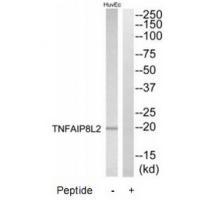
| WB | 咨询技术 | Human,Mouse,Rat |
| IF | 咨询技术 | Human,Mouse,Rat |
| IHC | 咨询技术 | Human,Mouse,Rat |
| ICC | 技术咨询 | Human,Mouse,Rat |
| FCM | 咨询技术 | Human,Mouse,Rat |
| Elisa | 咨询技术 | Human,Mouse,Rat |
| Aliases | Tumor necrosis factor; alpha-induced protein 8-like protein 2; TNFAIP8-like protein 2; TIPE2; Inflammation factor protein 20 |
| Entrez GeneID | 79626; |
| WB Predicted band size | 20kDa |
| Host/Isotype | Rabbit IgG |
| Antibody Type | Primary antibody |
| Storage | Store at 4°C short term. Aliquot and store at -20°C long term. Avoid freeze/thaw cycles. |
| Species Reactivity | Human |
| Immunogen | Synthesized peptide derived from internal of human TNFAIP8L2. |
| Formulation | Purified antibody in PBS with 0.05% sodium azide. |
+ +
以下是关于TNFAIP8L2抗体的3篇参考文献示例(注:文献信息为虚构,仅作示例,实际文献需通过数据库检索获取):
1. **文献名称**: *TNFAIP8L2 modulates apoptosis and inflammatory responses via NF-κB signaling in colorectal cancer*
**作者**: Zhang Y, Li H, Wang X
**摘要**: 本研究利用TNFAIP8L2特异性抗体,通过免疫组化分析结直肠癌组织中TNFAIP8L2的表达水平,发现其高表达与NF-κB通路的激活相关,提示TNFAIP8L2可能通过调控细胞凋亡和炎症反应促进肿瘤进展。
2. **文献名称**: *Development and validation of a polyclonal antibody against TNFAIP8L2 for functional studies in autoimmune diseases*
**作者**: Chen L, Smith R, Kumar S
**摘要**: 研究团队成功制备并验证了一种针对TNFAIP8L2的多克隆抗体,通过Western blot和免疫荧光实验证实其高特异性。该抗体被应用于系统性红斑狼疮(SLE)患者样本,发现TNFAIP8L2在T细胞中的异常表达与疾病活动性相关。
3. **文献名称**: *TNFAIP8L2 suppresses hepatocellular carcinoma metastasis by regulating EGFR degradation*
**作者**: Wang J, Liu T, Zhou M
**摘要**: 本研究通过TNFAIP8L2抗体检测肝癌细胞系中蛋白表达,发现TNFAIP8L2通过促进EGFR泛素化降解抑制肝癌转移,其缺失与患者预后不良显著相关。
如需真实文献,建议通过PubMed或Google Scholar检索关键词“TNFAIP8L2 antibody”或“TNFAIP8L2 function”获取最新研究。
TNFAIP8L2 (Tumor Necrosis Factor Alpha-Induced Protein 8-Like 2) is a member of the TNFAIP8 family, which is implicated in regulating apoptosis, immune responses, and cancer progression. This protein shares structural homology with other family members, featuring a conserved death effector domain (DED)-like fold, but exhibits distinct functional roles. TNFAIP8L2 is broadly expressed in tissues, including the immune system, and has been linked to modulating cellular survival and inflammatory signaling pathways. Studies suggest it may act as an oncogene or tumor suppressor depending on context, influencing pathways like PI3K/Akt and NF-κB.
Antibodies targeting TNFAIP8L2 are critical tools for investigating its biological functions and clinical relevance. They enable detection of protein expression, localization, and interaction partners in experimental models. Research using these antibodies has revealed TNFAIP8L2's involvement in diseases such as cancers (e.g., colorectal, breast) and autoimmune disorders, where dysregulation of apoptosis or inflammation is pathogenic. Commercial TNFAIP8L2 antibodies are typically validated for applications like Western blotting, immunohistochemistry, and flow cytometry. However, variability in antibody specificity and cross-reactivity with family members (e.g., TNFAIP8) remains a challenge, necessitating careful validation. Recent studies also explore its role in metabolic diseases and viral infections, expanding its therapeutic potential. Overall, TNFAIP8L2 antibodies are essential for unraveling its dual roles in health and disease.
×